Quick Summary: Artificial Intelligence in healthcare helps leaders understand how AI improves diagnostics, workflows, and patient experience through safe and structured adoption. This blog gives clear guidance on benefits, examples, planning steps, partner selection, and real success factors. Readers gain a practical roadmap for building reliable medical intelligence and preparing for responsible AI adoption inside clinical environments.
Artificial Intelligence in healthcare now guides major decisions across hospitals, diagnostic networks, research centers, and digital health platforms. Leaders rely on clear data, structured predictions, and accurate automation to improve clinical outcomes and manage rising operational pressure. Market growth supports the scale of adoption.
In 2022, the global Artificial Intelligence in the healthcare industry recorded a valuation of USD 15.4 billion, and forecasts project growth to USD 164.16 billion by 2030 with a CAGR of 49.1 percent from 2023 to 2030. (Source: Grand View Research)
Healthcare executives seek guidance that explains practical adoption, investment clarity, and direct benefits that support real progress. Stakeholders need reliable insights that connect clinical accuracy, workflow efficiency, and patient experience with clear business value.
You gain clear insight into how Artificial Intelligence in healthcare improves clinical accuracy, strengthens daily operations, and supports confident planning for future growth, especially when supported with an AI app development guide that explains each step with clarity.
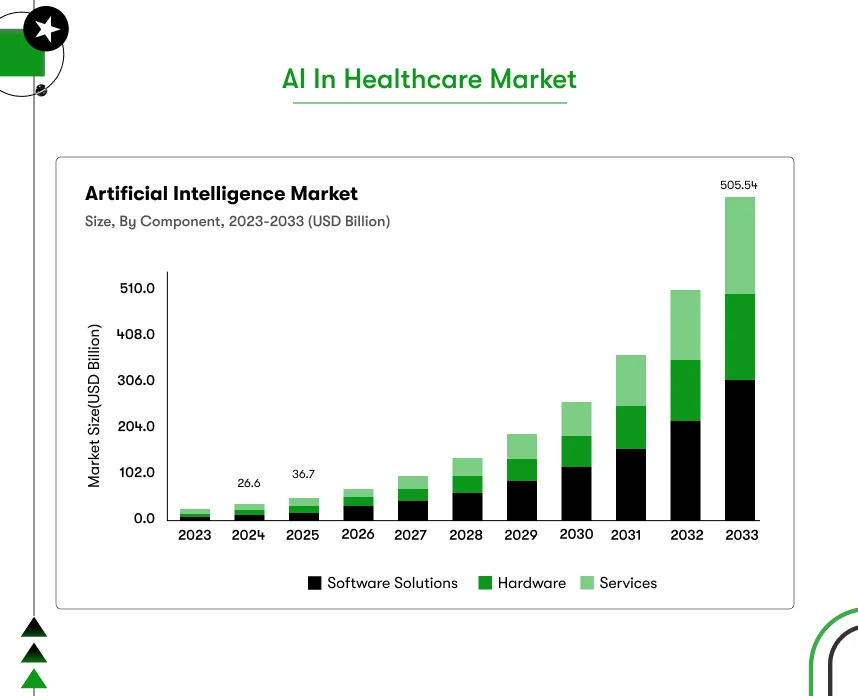
What is Artificial Intelligence in Healthcare?
Artificial Intelligence in healthcare refers to medical algorithms, clinical data models, and decision-support systems that guide doctors, technicians, and hospital teams with accurate insights. Professionals gain support from structured prediction models that study symptoms, scans, treatment histories, lab values, and operational records with consistent logic.
The question “what is artificial intelligence in healthcare” often appears during early evaluation, and the core idea centers on the ability of medical AI tools to process complex information with dependable accuracy.
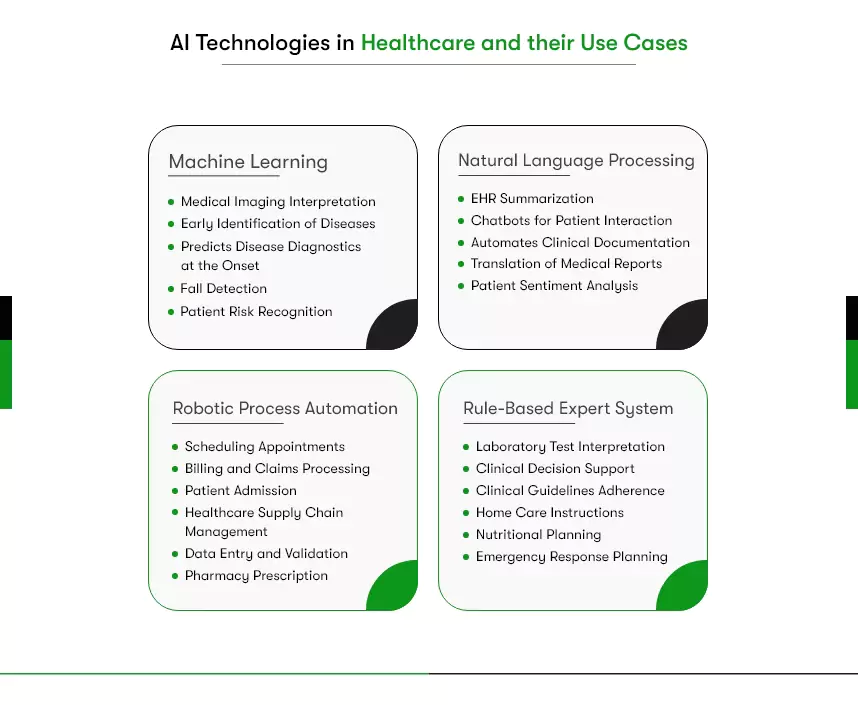
Artificial Intelligence healthcare systems identify patterns, highlight risks, and guide safe actions across diagnostics, imaging, patient monitoring, treatment planning, and administrative work.
Executives also explore “how is artificial intelligence used in healthcare” to understand real operational value. Common functions include prediction, automation, triage, reporting, and workflow planning.
Hospitals and research teams rely on these functions to improve outcomes, manage resources, and maintain quality standards. Leaders who study the use of AI in healthcare gain clarity on practical adoption, measurable value creation, and the long-term benefits that support confident investment.
How Is Artificial Intelligence Used in Healthcare?
Artificial Intelligence in healthcare supports clinical accuracy, workflow efficiency, and informed decision making across hospitals, diagnostic units, pharmaceutical research, and digital health operations. Leaders gain value through structured medical functions that guide teams with reliable insights.

The breakdown below shows how each function contributes to real improvements inside healthcare environments.
Diagnostic Support Across Clinical Departments
Artificial Intelligence in healthcare strengthens early identification of risks and guides precise medical evaluation.
Key functions include:
- Imaging analysis: Algorithms review scans from radiology, cardiology, oncology, and neurology with strong precision.
- Pattern detection: Medical AI tools highlight unusual clinical signals across ECG reports, lab results, and pathology slides.
- Symptom interpretation: Structured models assist doctors with symptom clusters that align with known medical conditions.
Executives who research the use of AI in healthcare often begin with diagnostic support because diagnostic accuracy influences treatment quality and patient safety.
Workflow Optimization Inside Hospitals
Organizations use Artificial Intelligence healthcare platforms to improve coordination among clinical and administrative teams.
Common improvements include:
- Patient flow planning: Medical AI tools estimate admission volume, waiting times, and discharge requirements.
- Resource scheduling: Hospitals plan staff availability, bed allocation, and equipment usage with predictive logic.
- Administrative assistance: Appointment management, clinical documentation, and triage inputs receive structured support.
AI in the healthcare industry plays a strong role in managing operational pressure, which helps teams maintain quality standards during high demand.
Treatment Planning and Care Path Guidance
Leaders who explore “how is artificial intelligence used in healthcare” often seek clarity on treatment-related functions.
Medical advantages include:
- Risk scoring: Prediction models calculate complication probability based on medical history and clinical indicators.
- Personalized planning: Treatment plans align with patient-specific records, genetic information, and therapy responses.
- Continuous monitoring: AI systems study real-time data from wearables, sensors, and remote care devices to support proactive action.
Hospitals and research teams rely on these structured functions to improve outcomes and reduce preventable errors.
When Artificial Intelligence in healthcare supports diagnostics, workflows, and treatment planning together, hospitals move beyond isolated tools and gain a connected intelligence layer across care.
Clinical teams see fewer blind spots, smoother handovers, and more reliable information at every step. AI development services then focus on expanding these strengths instead of fixing gaps.
These functions also help decision makers understand the real use of AI in healthcare and identify where AI development services can support deeper exploration of Artificial Intelligence healthcare applications.
What Are Examples of Artificial Intelligence in Healthcare?
Healthcare leaders explore real examples of Artificial Intelligence in healthcare to understand where measurable value appears inside hospitals, diagnostic networks, research centers, and digital health environments. The examples below present practical functions that influence accuracy, patient experience, and operational quality.
Early Disease Detection Through Medical Imaging
Medical teams use Artificial Intelligence in healthcare industry environments to support radiology, oncology, neurology, and cardiology. Trained imaging models review X-rays, CT scans, MRI reports, and ultrasound images to highlight clinical findings with consistent logic.
Common examples include:
- Tumor identification: Imaging models highlight abnormal cell clusters across breast, lung, and brain scans, which helps oncologists plan timely treatment without overlooking small patterns.
- Fracture detection: Algorithms examine orthopedic images to detect hairline fractures that may not appear clearly during routine review, which supports accurate decisions in emergency care.
- Stroke analysis: AI systems evaluate brain scans for early stroke indicators, which helps emergency teams act quickly and improve patient recovery potential.
These examples show how Artificial Intelligence healthcare tools assist specialists with decisions that depend on early detection.
Predictive Risk Scoring for Treatment Planning
Hospitals rely on prediction models to calculate complication probability based on clinical records, lifestyle indicators, lab values, and treatment patterns. These models guide teams toward preventive care instead of reactive action.
Examples include:
- Heart-failure prediction: AI models examine cardiac history, medication patterns, and vital indicators to identify patients with rising heart-failure risk, which helps cardiologists plan early interventions.
- Sepsis alerts: Algorithms study temperature, blood pressure, oxygen saturation, and lab values to detect subtle signs of sepsis, which helps clinicians act before the condition escalates.
- Diabetes progression analysis: Models read glucose patterns, lifestyle inputs, and prescription history to estimate long-term risk, which supports customized care plans for diabetic patients.
These use cases help leaders understand the use of AI in healthcare for treatment planning and proactive action.
Virtual Clinical Assistance for Patient Support
Digital health platforms use structured medical models to guide symptom analysis, care navigation, and continuous support. These systems help teams deliver accurate assistance without increasing workload.
Examples include:
- Symptom guidance systems: AI platforms study patient inputs such as pain location, duration, and intensity to suggest appropriate care routes, which helps patients reach the right specialist faster.
- Medication reminders: Automated systems send reminders based on prescription schedules, which helps patients maintain consistent medication habits during long-term treatment.
- Remote monitoring dashboards: Continuous data from sensors and wearables supports timely identification of changes in patient status, which helps healthcare teams deliver early intervention.
Executives review these examples to understand how AI in the healthcare industry improves patient engagement without creating additional workload for clinical teams.
Operational Management and Resource Planning
Organizations use Artificial Intelligence in healthcare industry operations to manage daily demand across departments. Predictive planning supports staff coordination, bed management, and supply tracking.
Examples include:
- Admission forecasting: Predictive models estimate patient entry volume based on historical patterns and seasonal trends, which helps administrators prepare adequate staff and resources.
- Bed-management planning: AI tools study care requirements and patient movement to recommend efficient bed allocation, which reduces bottlenecks in critical units.
- Supply-chain support: Algorithms track usage patterns for medicines, devices, and consumables to prevent shortages and reduce waste, which helps procurement teams maintain smooth operations.
These examples demonstrate how leaders rely on operational intelligence to maintain quality standards under pressure.
Artificial Intelligence in healthcare shows strong value through examples that improve accuracy and strengthen clinical operations. Leaders gain a clear view of how AI in the healthcare industry supports faster decisions and consistent care quality.
These functions highlight the practical use of AI in healthcare and prepare decision makers for deeper evaluation.
How Artificial Intelligence in Healthcare Creates Real Value for Hospitals and Clinics
Hospitals and clinics adopt Artificial Intelligence in healthcare to improve accuracy, strengthen daily operations, and deliver safer treatment plans. Leaders gain measurable improvements across diagnostics, patient support, and administrative workflows. The benefits below present real value that motivates healthcare teams to explore deeper adoption.
Higher Diagnostic Accuracy Across Departments
Artificial Intelligence healthcare systems support radiology, oncology, cardiology, neurology, and primary care with structured analysis.
Benefits of Artificial Intelligence in healthcare for diagnostic teams include:
- Precision in image review: Algorithms highlight subtle clinical observations in scans, which guides specialists toward accurate early decisions.
- Consistent pattern detection: Medical models analyze ECG signals, lab data, and symptom clusters to reduce missed findings.
- Improved clinical confidence: Doctors gain support from data-driven insights that strengthen evaluation quality across complex cases.
These improvements help leaders understand the real value behind the use of AI in healthcare for early detection and accurate evaluation.
Stronger Operational Efficiency for Hospital Teams
AI in the healthcare industry supports smoother daily operations through predictive planning and structured workflow assistance.
Operational benefits for hospitals and clinics include:
- Better patient flow management: Predictive logic estimates admission volume, waiting time, and discharge priorities to prevent bottlenecks.
- Optimized staff scheduling: Hospitals place staff strategically based on patient load, department urgency, and historical patterns.
- Accurate administrative support: Appointment planning, triage routing, and documentation tasks run with structured assistance.
Hospitals gain clear improvements in efficiency, which supports high-quality care without placing extra pressure on clinical teams.
Better Treatment Planning and Risk Management
Healthcare leaders rely on Artificial Intelligence in healthcare industry environments to support safe and personalized care decisions.
Treatment-related benefits for clinical teams include:
- Early risk identification: Prediction models calculate complication probability, which helps teams act before conditions escalate.
- Personalized care guidance: Treatment plans align with medical history, genetic indicators, and therapy response.
- Continuous monitoring: Real-time data from wearables and sensors supports proactive action during recovery or chronic care.
- Appointment Scheduling: Chatbots may help schedule and remind patients of their appointments, increasing patient engagement and lowering no-show rates.
The advantages of AI in healthcare help decision makers evaluate how AI supports stronger outcomes through accurate treatment guidance.
Better Patient Experience and Faster Support
Digital health platforms use structured medical intelligence to guide patient journeys with clarity and timely assistance.
Patient-experience benefits for healthcare organizations include:
- Guided symptom evaluation: Platforms interpret patient inputs and route cases to the right care level.
- Consistent follow-up reminders: Automated reminders support long-term treatment routines and medication adherence.
- Responsive remote monitoring: Continuous data supports timely support for chronic or high-risk patients.
These improvements help clinics maintain patient satisfaction while reducing manual workload.
Reliable Planning and Decision Support for Leadership
Executives who explore how Artificial Intelligence in healthcare supports leadership decisions gain a strong foundation for planning.
Strategic benefits for hospital leadership include:
- Accurate forecasting: Predictive models estimate resource needs, supply consumption, and staffing requirements.
- Clear performance insights: AI tools highlight trends in outcomes, turnaround time, and service gaps.
- Stronger strategic planning: Leaders use consistent data patterns to shape technology investments and quality standards.
This level of structured intelligence helps hospital leaders make confident decisions backed by real data.
Artificial Intelligence in healthcare creates measurable improvements across diagnostics, operations, treatment planning, and patient support. Leaders gain a clear view of how AI in the healthcare industry strengthens accuracy, efficiency, and long-term planning across hospitals and clinics.
These benefits help decision makers understand the practical use of AI in healthcare and prepare for responsible adoption.
If you are looking to transform your healthcare organization with AI enabled solutions, then you must go through our blog on: Digital Transformation in Healthcare.
How Hospitals Plan and Execute Safe Adoption of AI in the Healthcare Industry
Hospitals and clinics adopt Artificial Intelligence in the healthcare industry through structured planning that protects patient safety, supports clinical teams, and preserves compliance. Leaders follow clear steps that guide secure implementation, reliable performance, and responsible daily use.
The framework below presents the practical path hospitals use to introduce medical AI systems without creating operational risk.
Set a Clear Clinical and Operational Purpose
Hospitals begin with a defined purpose for adopting Artificial Intelligence in healthcare, because clear direction prevents misaligned projects and wasted resources.
Leaders identify one specific outcome that requires improvement, such as faster diagnosis, smoother patient flow, reduced administrative pressure, or clearer treatment planning.
A focused goal helps teams evaluate progress and measure real value once the system becomes active.
Prepare High-Quality Medical Data for Accurate AI Performance
Safe adoption requires medical records that follow consistent quality standards across departments.
Hospitals collect structured datasets such as imaging reports, lab values, prescription histories, and admission patterns.
Clean, reliable data improves model accuracy and prevents incorrect guidance during clinical work.
Data preparation also includes secure storage rules, access control, and compliance with healthcare regulations to protect sensitive information.
Select Trusted Technology Partners With Healthcare Expertise
Hospitals review potential AI partners based on real experience with medical environments, clear performance records, and strong compliance practices.
Leaders evaluate healthcare-specific case studies, model validation methods, and long-term support plans.
This careful selection ensures that the use of AI in healthcare aligns with medical safety requirements and continues to operate responsibly after deployment.
Start With Controlled Pilots Before Large-Scale Rollout
Hospitals introduce AI in a limited, controlled setting to confirm accuracy and identify adjustments before expansion.
A pilot program runs inside a single department such as radiology, triage, or appointment coordination.
Clinical teams review system behavior, turnaround time, and daily workflow impact.
Feedback from doctors, nurses, and technicians helps refine the system and ensures readiness for broader adoption.
Train Healthcare Staff for Confident and Safe Use
Successful adoption depends on teams that understand how Artificial Intelligence in healthcare generates insights and how those insights guide real clinical actions.
Hospitals conduct training sessions that use real cases, structured demonstrations, and supervised practice.
Staff members learn how to interpret AI outputs, how to combine them with clinical expertise, and when to escalate a case for manual review.
Training builds confidence and reduces safety risks.
Monitor AI Performance and Maintain Regulatory Compliance
Hospitals track accuracy, workflow impact, and patient outcomes to ensure safe and responsible daily use.
Leaders compare AI-generated insights with clinical standards, identify deviation patterns, and update datasets regularly to maintain reliability.
Continuous audits help confirm compliance with healthcare rules related to security, data protection, and clinical governance.

Monitoring strengthens long-term safety and operational trust.
A clear adoption path gives healthcare teams the confidence to step into a more capable future. Every structured step strengthens readiness for Artificial Intelligence in healthcare and sets a strong direction for safer, smarter clinical operations. Hospitals that take this approach unlock new clarity and new momentum for long-term innovation.
If by now you are sure of the type of AI enabled healthcare product you want to build, then you must read our blog on: Why flutter is the ideal tech stack for development of medical applications.
What Healthcare Leaders Need Before Starting an AI Project
Healthcare leaders who plan Artificial Intelligence in healthcare initiatives prepare a strong foundation before any technical work begins.
Hospitals and clinics organize clear objectives, reliable data, trained teams, and responsible governance models to support safe, accurate, and sustainable AI adoption. The points below outline the elements required before an AI project enters development.
A Defined Clinical or Operational Goal
Every Artificial Intelligence healthcare initiative requires a clear objective that aligns with a real challenge inside the hospital.
Leaders select one priority such as faster diagnosis, stronger triage support, better treatment planning, or smoother patient flow.
A defined goal guides the project team, sets expectations, and helps hospitals measure progress during implementation.
Clean, Structured, and Reliable Medical Data
Artificial Intelligence in the healthcare industry depends on high-quality medical data. Hospitals prepare structured datasets such as imaging files, lab values, prescription histories, and admission records. Clean and consistent data supports accurate model output and protects patients from incorrect recommendations.
Hospitals prepare data by:
- Reviewing accuracy of clinical records across departments.
- Organizing data into formats the AI system can process without errors.
- Removing outdated or incomplete entries.
- Applying strict access and security rules to protect sensitive information.
A Team Prepared to Work With AI-Supported Workflows
The use of AI in healthcare requires trained clinical and administrative teams. Hospitals prepare staff members to understand model outputs, interpret AI-supported insights, and combine digital guidance with professional judgment. A trained team reduces risk and supports responsible adoption.
Hospitals prepare teams by:
- Selecting doctors, nurses, technicians, and coordinators who will use the system.
- Organizing training sessions that use real clinical examples.
- Creating clear rules that define how AI insights support decisions.
- Planning continuous learning as the system evolves.
A Governance Model That Protects Safety and Compliance
Responsible adoption requires a governance structure that defines safe use, approval paths, oversight responsibilities, and audit routines. Hospitals rely on governance to maintain accuracy, protect patient data, and guide safe operations once AI becomes active inside clinical workflows.
Hospitals strengthen governance by:
- Defining clear rules for manual review and escalation.
- Planning periodic audits to verify compliance with healthcare regulations.
- Maintaining strong security controls for sensitive data.
- Assigning roles for system monitoring and reporting.
A Realistic Timeline and Clear Implementation Roadmap
Artificial Intelligence in healthcare initiatives require realistic timelines that respect data preparation, pilot testing, staff readiness, and regulatory approval. Hospitals build structured plans that guide each phase without disrupting patient care.
Hospitals organize timelines by:
- Scheduling pilot programs before full rollout.
- Planning integration windows that fit department workload.
- Coordinating training across all participating teams.
- Setting review checkpoints that confirm operational readiness.
Strong preparation shapes a future where AI supports healthcare with precision and confidence. When leaders gather the right foundation, Artificial Intelligence in healthcare becomes a powerful extension of clinical strength and operational discipline.
This preparation gains even more value when supported by teams with deep experience developing AI solutions, helping hospitals build a future shaped by accuracy, stability, and responsible intelligence.

How an AI Project Moves From Planning to Deployment in Healthcare
Hospitals that build Artificial Intelligence in healthcare solutions follow a structured development path that protects safety, supports clinical goals, and maintains compliance. Each phase builds clarity and confidence for teams that plan long-term adoption.

The steps below explain how a complete AI project moves from early planning to real deployment inside medical environments.
Step 1: Define the Problem and Project Scope
Healthcare leaders begin every Artificial Intelligence healthcare project with a clear definition of the clinical or operational challenge that needs improvement.
The project team identifies the affected workflow, the departments involved, the performance gaps, and the measurable outcomes required for success.
This clarity helps hospitals avoid unnecessary complexity and stay focused on one priority at a time.
Step 2: Prepare Medical Data for Safe and Accurate Use
Artificial Intelligence in the healthcare industry requires structured, complete, and high-quality medical data.
Hospitals organize imaging files, lab values, clinical notes, treatment histories, and admission patterns in formats suitable for model development.
Data validation, secure storage arrangements, and compliance checks protect safety and support accurate model behavior during later phases.
Step 3: Build the First Version of the AI Model
Development teams create an initial model that solves the specific problem defined during scoping. The model learns from clean medical data and follows strict performance guidelines designed for healthcare environments.
This first version functions as an early foundation that reveals strengths, gaps, and improvement opportunities.
Step 4: Validate the AI Model With Real Clinical Standards
Hospitals evaluate the model through structured testing that compares AI-supported insights with decisions taken by experienced medical teams.
Doctors, nurses, and technicians analyze accuracy, reliability, speed, and usability.
Any deviation from clinical standards leads to refinement, adjustment, or additional data preparation. This step protects patient safety and ensures responsible adoption.
Step 5: Run a Controlled Pilot Inside a Single Department
Hospitals test the AI system inside one department before any large-scale rollout.
A controlled pilot helps teams understand how the solution behaves inside clinical workflows, how staff members interact with AI insights, and how patients benefit from new support.
Pilot feedback guides improvements, user experience adjustments, and operational refinements.
Step 6: Train Staff for Confident and Responsible Use
Successful deployment depends on well-trained teams that understand how to interpret AI-supported guidance correctly.
Hospitals organize hands-on training sessions that use real cases and clear instructions.
Staff members learn when to trust model insights, when to escalate a case, and how to maintain safe and consistent daily use.
Step 7: Deploy the AI System Across More Departments
When the pilot shows reliable results, hospitals expand the deployment to additional departments or larger workloads.
The expansion phase follows structured rollout plans that protect patient care, maintain data accuracy, and ensure that clinical teams feel supported during the transition.
Step 8: Monitor Performance and Maintain Long-Term Safety
Healthcare organizations monitor accuracy, turnaround time, outcome quality, and workflow performance after deployment.
Regular audits confirm that the use of AI in healthcare remains safe and compliant.
Continuous improvements and periodic model updates prepare hospitals for long-term success and future innovation across more departments.
Each phase in the development journey brings hospitals closer to a more advanced and well-supported clinical environment. A well-executed path gives Artificial Intelligence in healthcare the structure it needs to progress from a concept into a trusted part of everyday care.
This approach also helps leaders understand how factors such as AI app development cost align with long-term planning, creating steady momentum toward a future where hospitals operate with greater clarity and confidence.
How Healthcare Organizations Select the Right AI Technology Partner
Hospitals evaluate AI partners through a structured approach that protects patient safety and supports long-term success with Artificial Intelligence in healthcare.
A capable partner offers strong clinical understanding, reliable development practices, and complete commitment to accuracy and compliance.
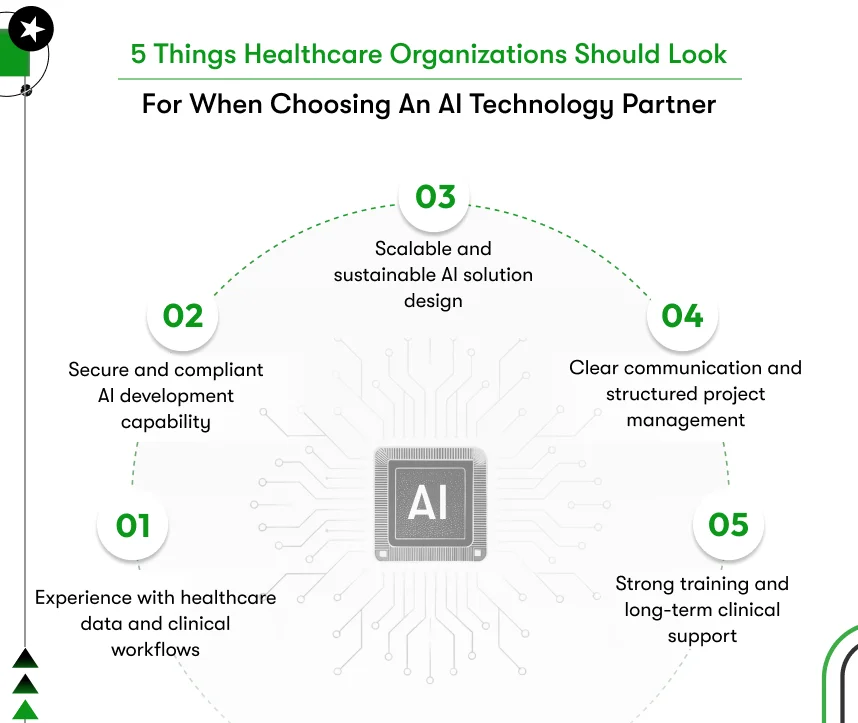
This evaluation also helps leaders identify teams where they can confidently hire AI developers who understand how AI in the healthcare industry must operate inside real clinical environments.
Experience With Healthcare Data and Clinical Workflows
Healthcare organizations select partners who understand how medical data moves through real clinical environments. Partners with proven healthcare experience design Artificial Intelligence healthcare systems that respect diagnostic routines, treatment paths, and departmental priorities.
Hospitals evaluate experience using the following criteria:
- A strong understanding of medical datasets used across imaging, diagnostics, treatment, and monitoring.
- Clear familiarity with clinical decision pathways across major departments.
- Alignment of AI-generated insights with validated medical standards.
Strong Capability in Secure and Compliant AI Development
Hospitals prioritize partners who follow strict rules for data protection, accuracy, and regulatory compliance. Secure development practices support safe daily use of Artificial Intelligence in healthcare and maintain trust across all departments.
Hospitals review security and compliance using the following criteria:
- Robust data protection measures that safeguard medical information.
- Proven ability to meet regional and international healthcare regulations.
- Structured accuracy testing that validates safe and reliable model behavior.
Capability To Build Scalable and Sustainable AI Solutions
Healthcare organizations prefer partners who design AI systems that support growth, updates, and new clinical requirements. Scalable design helps hospitals expand the use of AI in the healthcare industry across more departments as confidence increases.
Hospitals evaluate long-term capability using the following criteria:
- Whether AI models improve with new clinical data over time.
- The presence of clear update methods that maintain accuracy.
- Availability of technical support for multi-department deployment.
Transparent Communication and Clear Project Management
Hospitals select partners who communicate project plans, timelines, risks, and responsibilities with clarity. Transparent communication improves coordination between healthcare staff and technical experts.
Hospitals review communication and management using the following criteria:
- Detailed project roadmaps that outline each phase.
- Scheduled progress reviews that track development milestones.
- Consistent communication channels for questions and clarifications.
Complete Training and Long-Term Support for Clinical Teams
Artificial Intelligence in healthcare becomes effective only when clinical teams understand its use. Hospitals select solution providers who offer strong training, real-case demonstrations, and continuous support after deployment.
Hospitals evaluate support capability through:
- Organized training modules for doctors, nurses, technicians, and coordinators.
- Clear guidance that explains how to interpret AI-generated insights.
- Ongoing monitoring and performance evaluation after the system goes live.
Selecting the right team shapes the quality of every future decision supported by Artificial Intelligence in healthcare. Hospitals that rely on experienced Healthcare IT consulting partners gain safer planning, stronger implementation, and clearer long-term direction.
This choice builds a path toward steady, reliable intelligence inside clinical environments and supports progress that aligns with real medical needs.
Conclusion
Artificial Intelligence in healthcare strengthens clinical accuracy, improves daily operations, and supports smoother patient journeys when hospitals adopt it with clear goals and responsible planning.
Each step in the process builds confidence and prepares teams for safer, more efficient medical workflows. Leaders who follow this path move toward a future shaped by clarity, reliable intelligence, and measurable progress across their organization.
Kody Technolab supports this growth with a complete development approach built specifically for healthcare needs. The team studies real clinical challenges, prepares secure data foundations, and designs models that operate safely inside hospital environments.
Hospitals work with Kody Technolab to improve existing systems and develop new AI-powered solutions that match real clinical expectations. Each project receives structured planning, transparent communication, and long-term support. This commitment helps healthcare organizations move forward with confidence and achieve dependable results from modern medical intelligence.

Frequently Asked Questions
1. How does Artificial Intelligence in healthcare improve clinical accuracy?
Artificial Intelligence in healthcare analyzes medical records, imaging data, and symptoms with higher consistency than manual review. Hospitals use these insights to support early detection, risk scoring, and treatment planning. This improves accuracy across diagnostics and reduces missed findings in busy clinical environments.
2. What is the real use of AI in healthcare for hospital operations?
AI supports scheduling, resource allocation, documentation, triage, and workflow coordination. It reduces administrative load, shortens patient wait time, and helps teams focus on clinical responsibilities. This gives hospitals a stronger operational structure and predictable daily workflows.
3. How much time does it take for hospitals to adopt AI responsibly?
Adoption time depends on data readiness, workflow complexity, and the scale of the project. Most hospitals begin with a focused use case, refine data quality, test performance in controlled settings, and expand after gaining confidence. This phased approach keeps adoption safe and predictable.
4. What skills do hospitals need before starting an AI project?
Hospitals need organized datasets, clear clinical goals, trained teams, and strong governance. Leaders also benefit from support from specialists who bring experience in AI systems for healthcare environments. This preparation ensures safe integration and consistent results.
5. How do hospitals manage risks when using AI for medical decisions?
Hospitals use structured validation, clinical oversight, secure data practices, and strict access controls. Every model goes through testing, bias checks, accuracy review, and continuous monitoring to protect patient safety. These controls build confidence in daily use.
6. Is AI safe for sensitive patient data?
Safety depends on encryption, access rules, audit logs, and responsible data management. Healthcare teams work with partners who follow strict compliance standards and build solutions that protect clinical information across every stage of the project.
7. Can hospitals estimate AI investment before starting?
Hospitals can estimate investment once goals, workflow needs, model complexity, and data requirements are clear. Early discussions with an experienced Healthcare IT consulting team give leaders a reliable view of possible effort and budget. This clarity supports informed planning.
8. What type of AI solutions are most effective for hospitals?
High-impact solutions include diagnostic support systems, medical imaging analysis, triage automation, workflow automation, remote monitoring dashboards, and clinical decision support tools. These solutions improve accuracy, speed, and daily efficiency for clinical teams.
9. Do small or mid-size hospitals benefit from AI adoption?
Yes. AI helps smaller hospitals reduce workloads, strengthen decision support, and manage resources with more precision. Many hospitals begin with a small application and expand when they see measurable improvements.
10. How does Kody Technolab support AI adoption for healthcare organizations?
Kody Technolab prepares secure data foundations, studies real clinical workflows, and designs solutions that operate smoothly inside hospital environments. The team offers guidance across strategy, development, testing, validation, and ongoing support. Hospitals work with Kody Technolab to improve existing systems and develop new AI-powered solutions built for clinical accuracy, operational strength, and long-term safety.
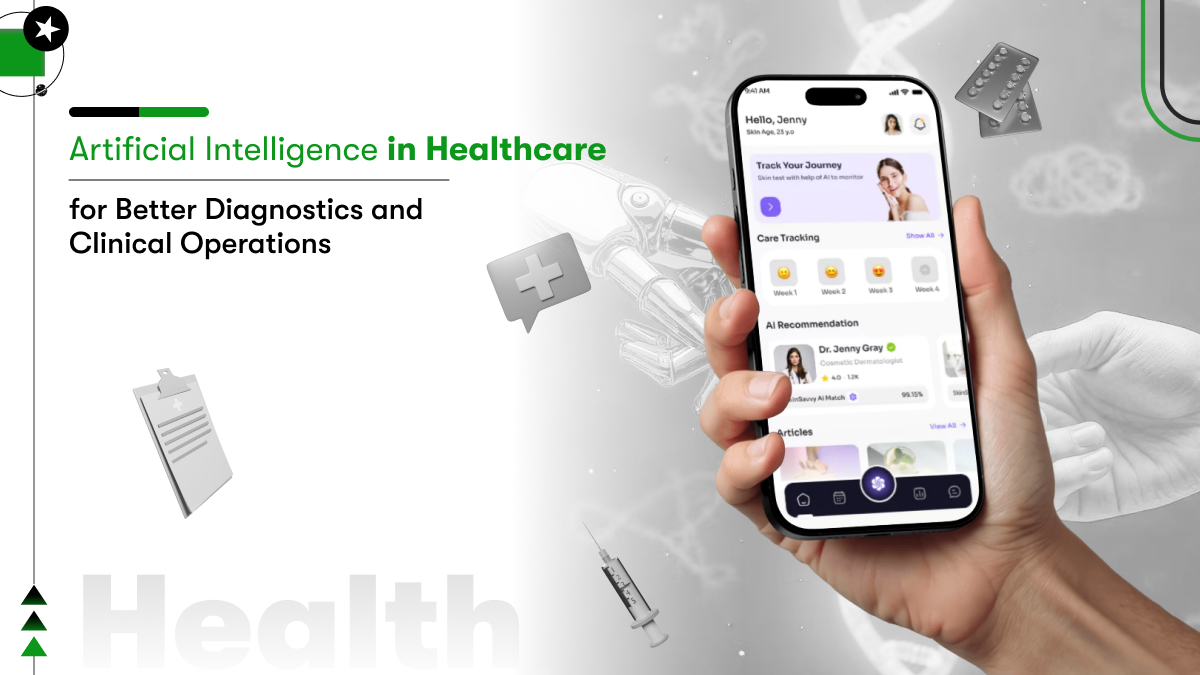

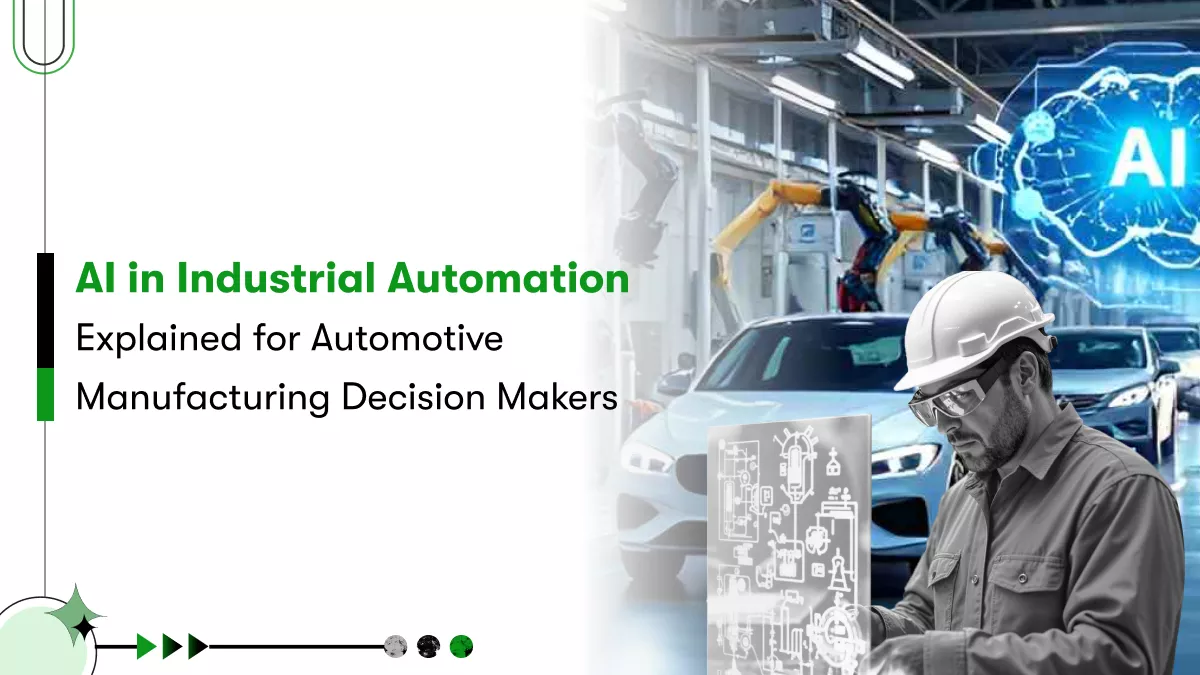
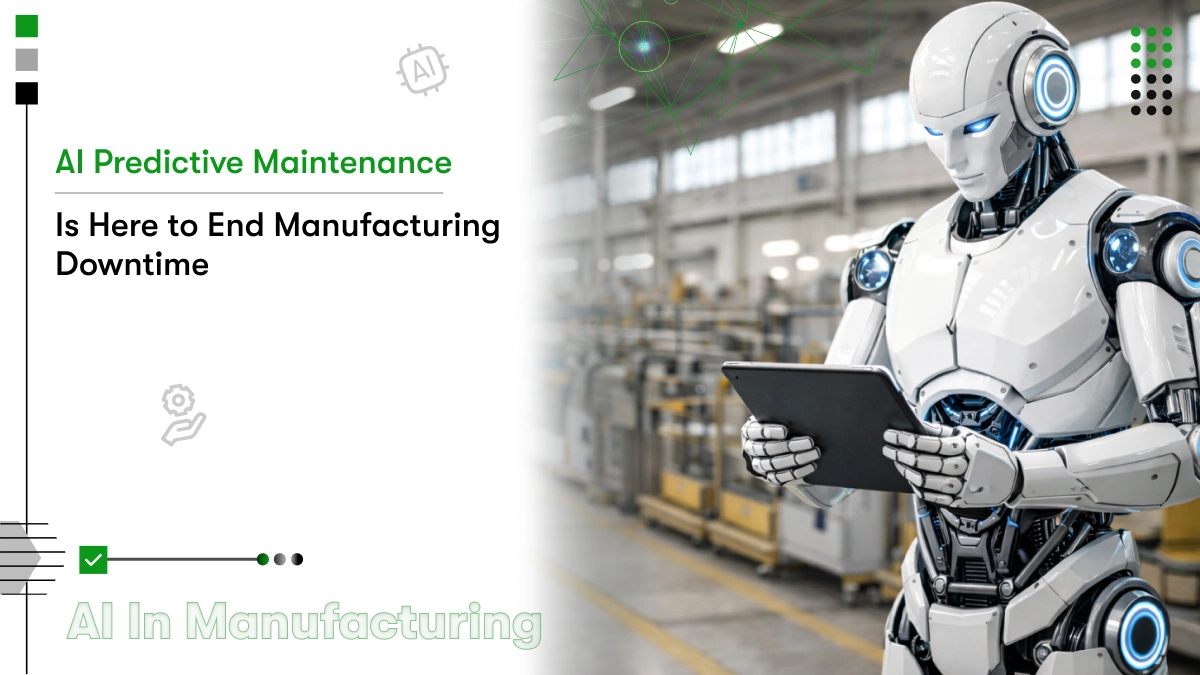

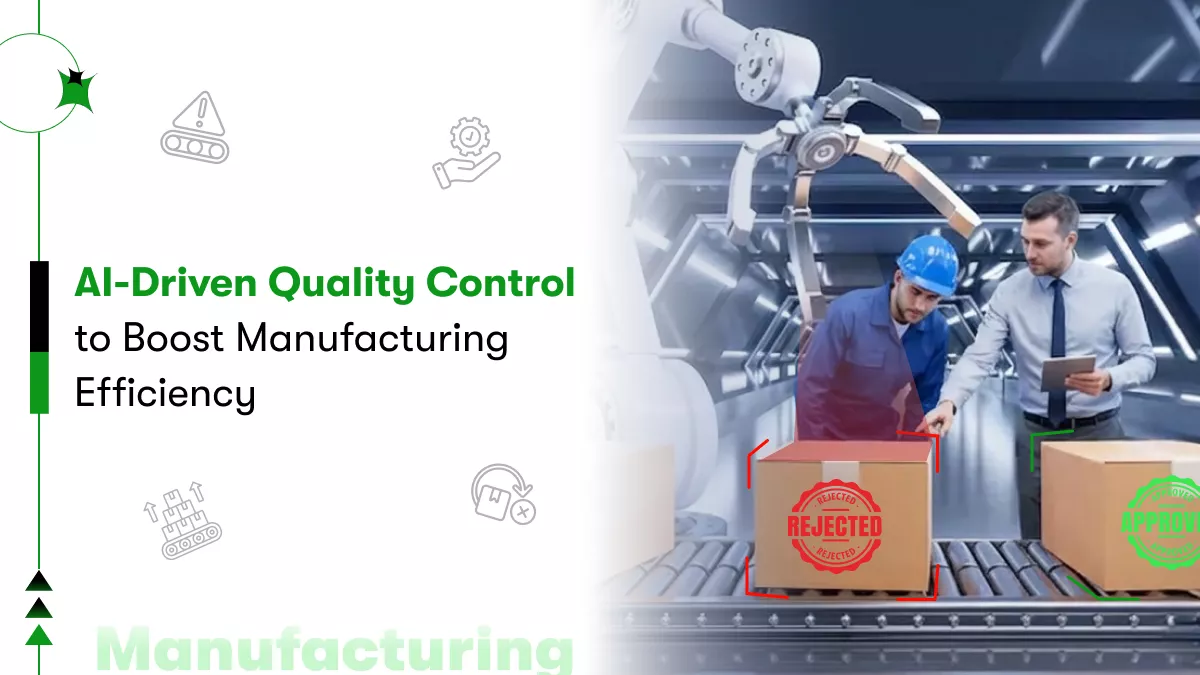






 Contact Information
Contact Information